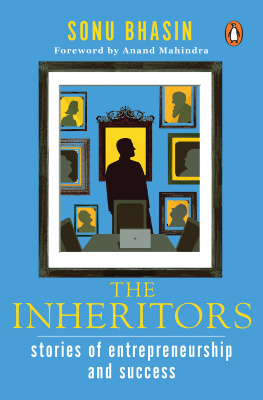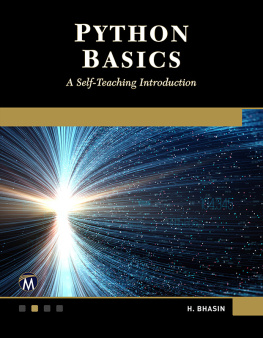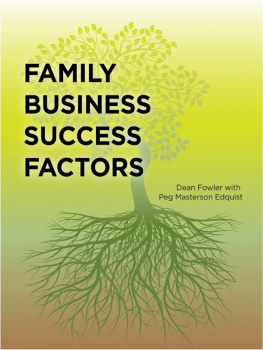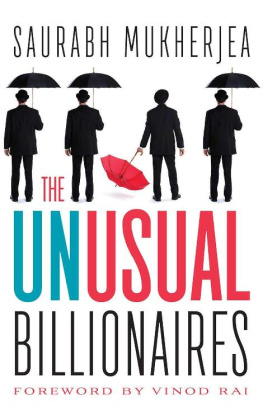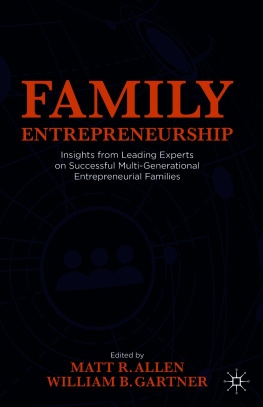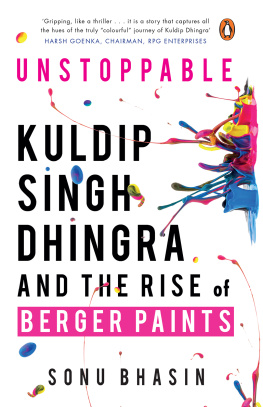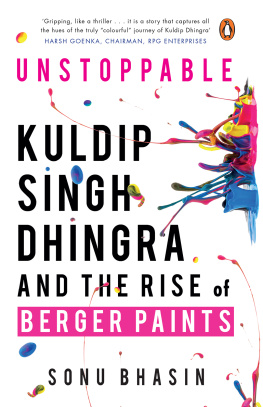I f there is one thing I have learnt from my years in leading a business, it is the power of the story. If a picture is worth a thousand words, then a story is worth a thousand sermons. Stories encapsulate messages in a way that makes them hard to forget.
In my own group, when people want to describe the business, its history, its progress and its culture, I find that they dont talk about profit figures or growth statistics or revenue projections. They talk about storiesstories about the people whose personalities shaped the company, stories about the ways in which the company coped with good times and bad, stories illustrating the values that are a torch passed down from generation to generation.
Sonu Bhasin has very effectively used the medium of stories to trace the trials and triumphs of some outstanding family-owned businesses in India. Family-owned companies are the backbone of Indian industry. At last count, fifteen of the top twenty Indian businesses in India were family-owned, in some sense of the phrase. They enjoy advantages like agility, nimbleness and speed of decision-making. They also face the challenges of family dynamics and culture, intergenerational perspectives and handling succession. This book elicits the family perspective on all these aspects. The stories it articulates convey all the difficulties, all the challenges, all the drama and all the rewards of creating a business that flourishes over generations. Reading these sagas in the words of the people who lived them makes an impact that no classroom lecture can match.
Introduction
F amily businesses are the unsung heroes of the Indian economy.
We know that they are all around us but we havent really acknowledged their contribution to the economy. It is not because we dont want to; rather, it is because we are not aware of the quantum of their contribution.
Data shows that approximately 90 per cent of world commerce is in the hands of family-owned businesses. They contribute 6090 per cent of the GDP in their respective economies, are the largest employers outside of the government and deliver better profitability, consistently, when compared to their non-family-owned counterparts.
There is usually a set of qualities and characteristics that are associated with any hero. Such is the case with family businesses. Each of them has its own set of heroic characteristics that makes it unique. However, there is one aspect that is common to all successful family businesses and that is the spirit of entrepreneurship.
The Oxford dictionary describes entrepreneurship as the activity of setting up a business or businesses, taking on financial risks in the hope of profit. But as I sat and listened to the protagonists of The Inheritors tell their stories, I realized that the dictionary meaning was unidimensional and somewhat dry. It fails to capture the grit and determination, the ambition and passion, and the focus on getting things done.
The spirit of entrepreneurship displayed by the people in this book goes far beyond just setting up a business or taking on a financial risk. During my conversations with them, I learnt of their ability to look at early failures squarely in the face, their refusal to stay down after their stumbles, their motivation to get back up, dust themselves and move on, their conviction in their own self and their business concepts, their confidence to do things differently, their knack for forcing their competitors to also do things differently, their ability to treat their legacy as a blessing rather than a burden and, most importantly, their unrelenting focus on their family values.
Amit Burman and Agastya Dalmia both faced harsh challenges in their first business ventures but they refused to be cowed down by them. Harsh Mariwala had conviction in his own belief of how a business should be run and he followed his heart to make it happen. Tara Singh Vachani focused on her innermost bhavna to create a path-breaking business. Motilal Oswal, Raamdeo Agrawal and Arjun Sharma were outsiders in tightly held industries and they first made a place for themselves and then changed the rules for everyone. Rishabh Shroff and Pooja Jain did not let the heavy burden of their illustrious legacy come in the way of their work. Kuldip Singh Dhingra and Gurbachan Singh Dhingra built a large business without sacrificing an iota of their family values.
The stories in The Inheritors are about real people and real businesses. These are stories of real challenges, real fights in the marketplace and real achievements. Each story celebrates the spirit of entrepreneurship and this spirit is played out by each protagonist in a unique manner. Thus, whether the stories are about success or even failure on the way to success, you are likely to identify with the characters and the stories. You can then decide, individually, of course, what you take away from each story.
My key learning after spending time with the heroes (of both genders) of The Inheritors has been the following: while entrepreneurship may or may not lead to success, there is no success possible without the spirit of entrepreneurship.
Over to the inheritors for their own stories.
Happy reading!
1
Dabur Group and Lite Bite Foods
Amit Burman
I am confused. Did I not have an appointment with Amit Burman, vice chairman of Dabur Indiathe 133-year-old company known for iconic products like Hajmola, Dabur Chyawanprash and Dabur Amla Hair Oil? Amit had asked me to come to his office for the meeting. As I walk into the building, I see posters of well-known brands. But to my knowledge, none of these are Daburs. I walk up the stairs with posters of Caf Delhi Heights, Zambar, Fres Co, Punjab Grill, Street Foods and Baker Street accompanying me. Am I in the wrong office? I begin to wonder. I turn back and ask the guard at the gate,

